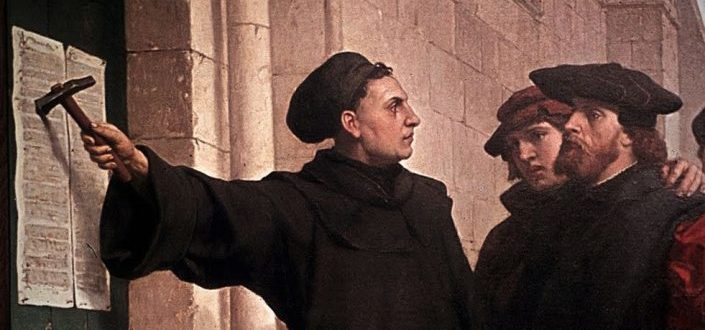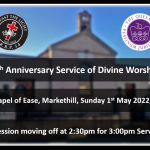Reformation Day
On this Reformation Day, the 503rd anniversary of Martin Luther nailing his 95 theses to the door of Wittenberg Cathedral, Imperial Grand Chaplain Sir Knight Dr Rev Phil Rimmer examines the significance of the Protestant Reformation and the importance of justification by faith alone, for each and every one of us.
October 31 is remembered by many people as Reformation Day, as this was the day in 1517 that Martin Luther nailed his 95 theses to the door of Wittenberg Cathedral in Germany, and this was the event that God used to trigger what we call today the Protestant Reformation.
When one looks back on history we are basically looking at the unfolding of God’s sovereign eternal purposes, and there are a number of events which stand out as being important stepping stones leading up to the Protestant Reformation of the sixteenth century.
There was, for example, John Wycliffe, who died in 1384 and is known as the Morning Star of the Reformation. Wycliffe translated the Bible from Latin into English. His followers were known as Lollards and many were persecuted and martyred in England because of their faith.
It was around the year 1440 that the printing press was invented in Germany and this had a profound influence on the Protestant Reformation, as literature became easier to distribute quickly.
Another important stepping stone was the fall of Constantinople to the Muslim Ottoman Empire in 1453 and with it the bringing of Greek manuscripts to western Europe, where academics already had a keen interest in old manuscripts because of the Renaissance.
It was this that would lead to the publication of a Greek New Testament by Erasmus and later to an English Bible.
And there was also at this time an awareness amongst many godly people that the Church of Rome had become corrupt in many areas and that there was a general need to reform the church.
God was also working in the life of Martin Luther. It was God who sent the violent thunderstorm which persuaded Martin Luther to become a monk and then led him to question how his sins could be forgiven and, in particular, the sale and use of indulgences.
And so, on October 31, 1517, Martin Luther nailed his 95 theses to the door of Wittenberg Cathedral, which was used as a notice board. The theses had been written in Latin, the language of academia, with a view to starting a debate on the subject of indulgences and reform of the church, but they were quickly translated into German and printed copies quickly circulated.
The spark had been lit and the Protestant Reformation was now under way!
In particular, Martin Luther was to become associated with two important doctrines, the doctrine of the authority of scripture over church tradition and the doctrine of justification by faith alone. It has been rightly said that justification by faith alone is the mark of a standing or a falling church!
As we look back on the Protestant Reformation today there are many reasons to praise and thank God. It was the Protestant Reformation which gave us church services in our own language, and it was the Protestant Reformation that gave us the Bible in our own language.
The Protestant Reformation rediscovered for us that our final authority in religion is in scripture alone, where it is taught that salvation is through Christ alone, and this is an act of God’s grace alone, which is received by faith alone, and it is all to the glory of God alone.
“Now therefore, our God, we thank thee, and praise thy glorious name.” (1 Chronicles 29:13)



